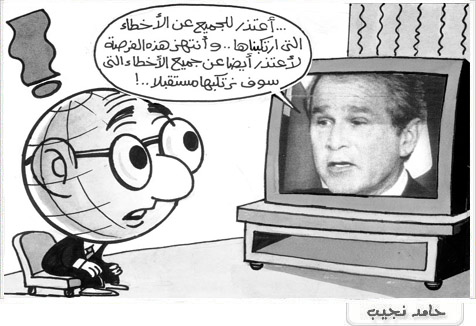The Nation,
Pakistan
As with Saddam, End of Zarqawi No 'Turning Point' for Bush
EDITORIAL
June 9, 2006
Pakistan - The Nation - Home Page (English) 
HOPES
being expressed by the White House that with the death of Mr. Abu Musaab Zarqawi, Washington is
nearer the goal of creating a stable pro-U.S. system In Iraq, are likely to prove
unrealistic.
Soon
after the fall of Baghdad in May 2003, victory was declared and hopes for an
early return of U.S. forces were expressed by a jubilant President Bush. With American
fatalities mounting, blame was put on the Baathists and the capture of Saddam
was defined as the new turning point in the war.
But as Iraq
became even more ungovernable, Mr. Zarqawi was demonized as the actual source
of terrorism. Now, President Bush considers his death a potential turning point
in the ongoing battle against the militants. But many think that for all their
spectacular suicide bombings, it hasn't been Mr. Zarqawi and his followers that
have been responsible for a majority of attacks or fatalities. Iraq is beset by
sectarian militias as well a good number of amorphous guerilla groups that are not
controlled by a singular command.
Washington’s
calculations about Afghanistan have proved similarly unrealistic. The defeat of
the religious militia [the Taliban] was hailed as great victory for America's state-of-the-art
weaponry. American satellites could spot the smallest movement on the ground, allowing
weaponry to targets precisely. The enemy, it was maintained, would not know
what had hit him.
But what
happened instead is that the militants broke the myth of weapons superiority being
the crucial factor in a hit-and-run war. Since the overthrow of the Taliban
regime, more American troops have died, and militants in that country have increasingly
utilized tactics developed by their counterparts in Iraq [See Video Below]. With every passing
year, the resistance has grown and new records of American and allied
casualties have been set. Anti-U.S. slogans are now shouted and posted right
inside Kabul, and most Afghans resent the presence of foreign troops.
 'I apologize for the mistakes we made in our past wars ...
I also apologize
'I apologize for the mistakes we made in our past wars ...
I also apologize
for the mistakes we will make in our future wars.' [Alittihad, Palestine].
------------------------------------------------------------------------------
American
and allied forces are bogged down in Iraq and Afghanistan, where they find it
difficult to stay and equally difficult to cut and run. In the eyes of the
common man, the regimes that have been set up in the two countries lack
legitimacy. Seen as collaborators with occupation forces, part of the hatred
against the Americans is deflected toward the administrations they have helped
to create.
There is
therefore a need for Washington to reconsider its policy, which appears more
based on hubris than genuine national interests. As Vietnam demonstrated, it
cannot win an unjust and immoral war. As long as foreign troops remain in Iraq
and Afghanistan, anti-U.S. sentiment will continue to rise. The so-called War
on Terror cannot be won by way of terrorist acts like the Haditha killings,
which is only the latest example. To win this war, a withdrawal of U.S. troops
and compensation for the devastation that America has inflicted on Iraqis should
be the order of the day.
VIDEO FROM AFGHANISTAN: TALIBAN LEARNING FROM IRAQI INSURGENTS
 AL-JAZZERA TV, QATAR: Excerpts from an interview with Taliban military commander Mullah Dadallah, May 31, 2006, 00:09:16 MEMRI
AL-JAZZERA TV, QATAR: Excerpts from an interview with Taliban military commander Mullah Dadallah, May 31, 2006, 00:09:16 MEMRI
"The bombings we carry out - we learned it from them. We learn other types of operations from them as well."

Mullah Dadallah, Taliban Military Commander